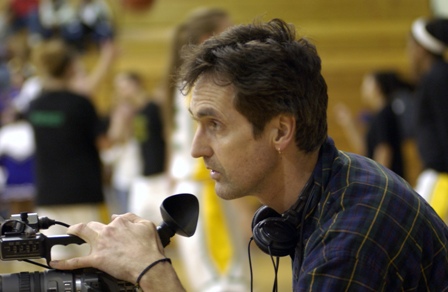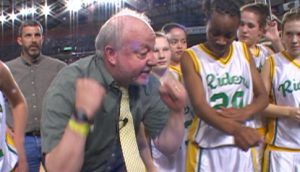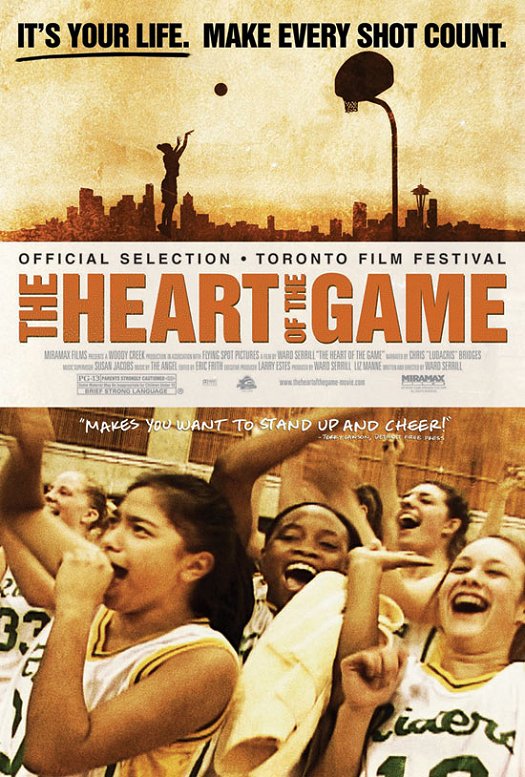Finding and filming “The Heart of the Game”

Bill Resler with Darnelia Russell from “The Heart of the Game.”
This article first appeared in the spring 2006 issue of UW Business.
Bill Resler, an eccentric senior lecturer in tax accounting and part-time basketball coach whose scruffy appearance has been described as “Santa Claus in Birkenstocks,” doesn’t exactly fit Hollywood’s image of a leading man.
Ward Serrill (BA 1978), a former CPA who doesn’t own a television and describes himself as something of a hermit, would seem just as unlikely to be rubbing elbows with Tinseltown’s glitterauteurs.
But it’s happening. The two have collaborated on a documentary that has been championed by a major distributor and is riding serious buzz into this summer’s film season. “The Heart of the Game,” Serrill’s debut feature film, chronicles seven years of drama, laughter, heartbreak and triumph in the life of Seattle’s Roosevelt Roughriders girls basketball squad.
“When you wander into a girls high school gym with a video camera, you don’t expect that seven years later you’re going to have a deal with Miramax and be distributing the movie around the world,” says Serrill, whose own back story would be dismissed as too unbelievable by any screenwriter worth his clichés.

Director Ward Serrill
After graduating from the Business School with a degree in accounting, Serrill went to work for Ernst & Whinney and volunteered to take on some small clients in Alaska for the adventure. He developed a “primal connection with the gourmet water and air,” joined a tribal corporation as controller, then started a cultural tourism program and got into making promotional films. When he returned to Seattle in 1996 he went to work for Pyramid Communications, eventually producing short films for charitable foundations and non-profits.
Shortly after his return, Serrill was invited to dinner by his old friend Steve Rice, a senior lecturer in accounting who just happens to co-direct the Master of Professional Accounting Program in Taxation with Resler. Resler, a life-long basketball junkie, had just begun coaching the varsity girls basketball team at Roosevelt when they couldn’t find anyone else. The two hit it off immediately.
“I knew right away that I was in the presence of a world-class storyteller,” Serrill recalls. “I eventually followed Bill into the gym and found that he’s also a true court jester. He has this ability to get girls to work their butts off and still have fun. They were crashing into each other and laughing. I thought, our culture has forgotten about this passion and enthusiasm and fun in its mania to win at all costs.”
Serrill started filming. His camera captured an amazing story that first season, as Resler’s unorthodox coaching methods inspired his team to unprecedented success. He regaled the girls with corny credos and a work-hard-play-harder ethic. He instituted a players-only “inner circle,” where they could deal with problems and make team decisions free from the influence of parents and coaches. And he began a tradition of adopting some violent, totemic animal for each season (when they were piranhas the pre-game cheer was “Tear at their flesh!”).
Says Resler: “The girls mock it, of course. They say, ‘It’s so cheesy. It’s so Bill.’ But then, ‘It really pumps me up.’”

Passion in action
Naturally, he’s hidden a message of empowerment in all this indelicate fun. “I want the girls to own their own turf and be able to defend it,” adds Resler, who has three daughters of his own.
Roosevelt owned a lot of turf that first season, going undefeated before losing in the state championship game. And Serrill had his film. He only returned the following season to get some extra footage. “And then Darnelia Russell walked into the gym,” he recalls, “and I knew something important had happened.”
Serrill switched on the camera again. And as the years passed the film took on a deeper human texture as it followed the epic struggles of Russell, a charismatic African American sent to the school in an affluent north Seattle neighborhood to make a better future for herself.
But the heart of the film never strays too far from its celebration of unbridled passion in playing the game. When Serrill finally stopped shooting, after Roosevelt won the 2004 state title, he had more than 200 hours of footage. And it was all good. Two years of editing have yielded a taut portrait of a team that more than lives up to its scrappy historic nickname.
Serrill hired the sales team that brought “Hoop Dreams” to the multiplex and screened “The Heart of the Game” at the Toronto International Film Festival, the traditional launching pad for Oscar contenders. Iconic critic Roger Ebert predicted it would be the sleeper hit of the fest. By the end, it was taking no one by surprise. It had become a phenomenon. Miramax was the highest bidder.
 For the fun-loving coach, the film has been eye-opening. “I know that I’m off-center and I approach the world in a kind of bizarre way and pursue fun more than most,” Resler says. “But I didn’t realize what an odd person I am until I saw the movie, and watched the Toronto fans react to my personality.”
For the fun-loving coach, the film has been eye-opening. “I know that I’m off-center and I approach the world in a kind of bizarre way and pursue fun more than most,” Resler says. “But I didn’t realize what an odd person I am until I saw the movie, and watched the Toronto fans react to my personality.”
For Serrill, the experience has been transformational. He’s quit his day job to promote the film on the festival circuit, and is fielding offers to collaborate on his next project. “It’s a magic carpet ride,” he muses. “It really is. My life has already changed dramatically. Bigger and bigger doors keep opening and I just keep stepping through them.”
Resler, Hobbit-like, remains blissfully ignorant of the Hollywood machine… for now. “The Heart of the Game” doesn’t open until June, and there’s no telling what demands and opportunities may lay ahead if it becomes a hit.
“About three weeks after Toronto I got an e-mail from one of the handlers in New York telling me that my life is going to change, that I’m not going to be able to do the stuff that I used to do,” he says. “I replied that I’m 60 years old and the most conceited person you’ll ever know. I love coaching basketball and I love teaching tax even more. To have my office wallpapered with the IRS code is my essence. So how are they going to impact me? The handler e-mailed back: ‘I’ve heard it before.’
“So now I’m intrigued…”
Bill Resler passed away February 4, 2017, at the age of 71.
